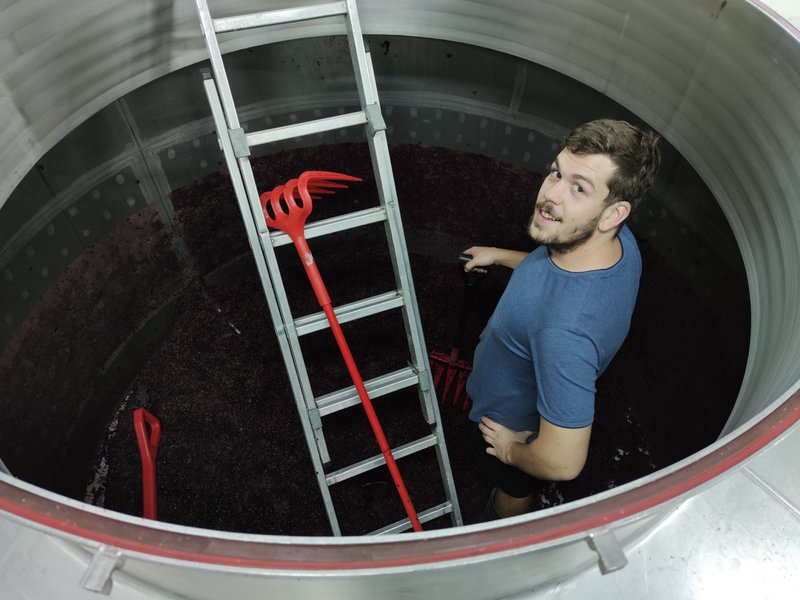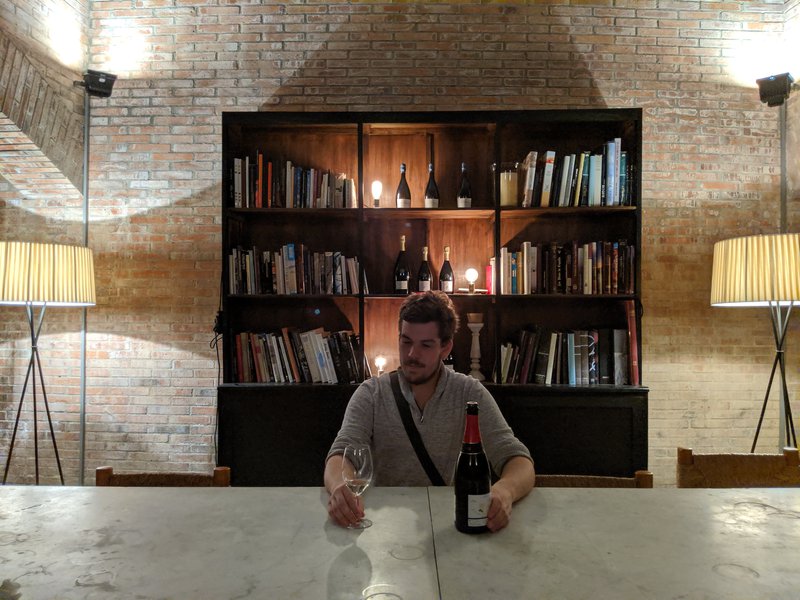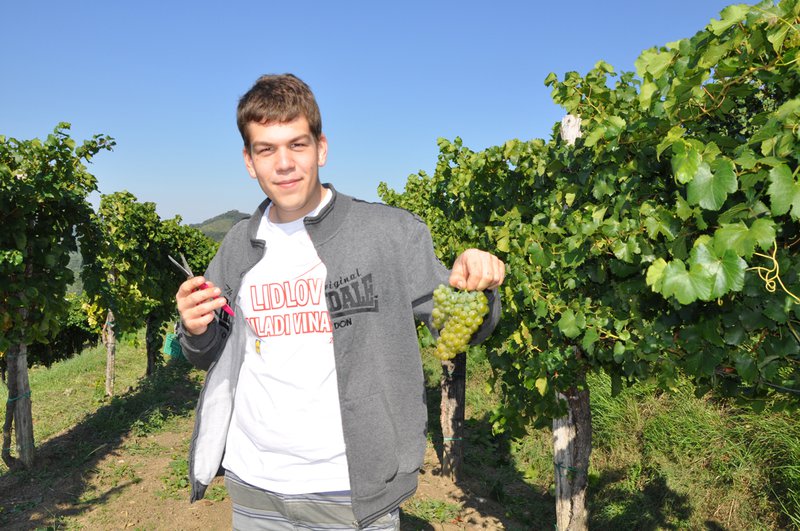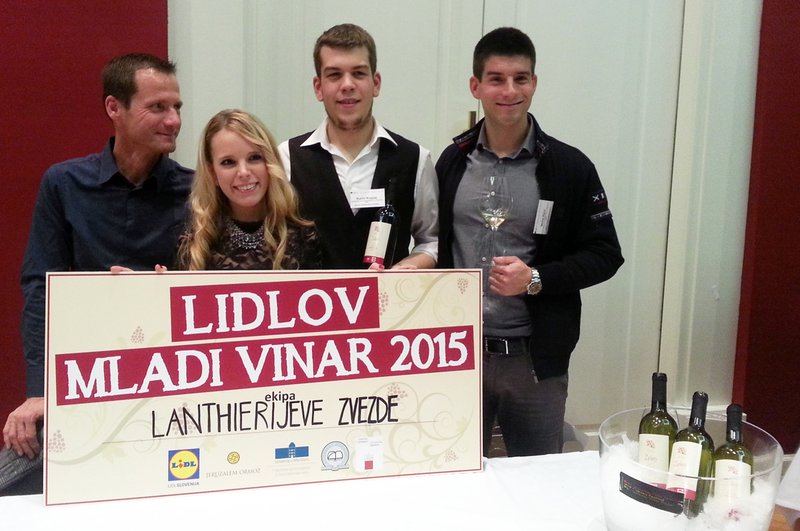Karlo Kopjar
Graduate of the Bachelor's study programme Viticulture and Enology
Karlo, what inspired you to study at the School of Viticulture and Enology?
Simply the wine itself. Before starting my studies I by no means knew in what a rich world I was going to immerse myself. But I admit that I found the wine culture that I had been admired very interesting, although I had only basic knowledge of it.
The studies were something new for you and you soon became drawn in by this study field. What inspired you most while studying viticulture and enology?
Especially the width and depth of the knowledge we obtained. You might think that the studies only cover natural sciences, but they cover social sciences as well. And it was actually this variety of areas covered that motivated me to pursue further studies, research is always present in viticulture and enology.
Your story is a story of a courious student who was eager to learn new things, gain new knowledge and competences. And you started gaining practical experience even before you took your compulsory practical placement at the School. Why was that so important for you?
When you once gain practical experience, you also understand theory better. Of course it is true that you can also understand theory without practical experience, but in viticulture and enology practical experience is of utmost importance, as you have to find it out yourself how to produce or do something. I enrolled into this study programme without any previous practical experience and I have to say that, when you take up your first job, you need some time to bring together the theory and practice. Practical experience can also be viewed as an indispensable tool for your future profession, as it allows you to tackle any issue much faster. I would also like to add that it is worth to collect the experience at various estates because each of them has its own approach towards work and this gives you extra experience for your future career and at the same time helps you build your own personality and you learn to understand people better.
Please tell us about the practical experience that the students can obtain during their studies. The syllabus of this study programme is made up of a significant share of practically-oriented activities, from the second year onwards.
I would recommend the students to take up practical placements in companies or organisations where they think they could learn new things and where the type of placement offered suits them. It may happen that the placement is of a rather passive type, but I warmly advise a »hands-on« experience. I would like to stress that also the students whose families own an estate, can gain a lot from performing their practical placements at another estate, as each winemaker has his or her own approach towards work and the students can thus learn something new and later use that in their professional careers.
The students can also gain practical experience abroad if they wish. A lot of estates actually offer various seasonal jobs and even accommodation during the harvest time. It is useful to take up such a job because you can get experience and also learn form a new perspective. But you have to be persistent, a lot of people seek for this kind of jobs, so you have to submit quite a few applications.
During your studies you could choose between a wide array of elective subjects. Why is it important to offer such a variety of courses to students?
It is important to offer different courses because viticulture and enology cover so many areas, which the students can specialise in. And the more you know various fields, the more you can contribute to the development of products and projects.
During your studies you took every opportunity to gain extra knowledge. You were also a member of the team competing at the »Lidl’s Young Enologist« contest. Can you tell us a bit more about this experience and why it is useful for the students to participate in such contests?
Such contests can give you specific experience that you cannot get in the lecture rooms. They can motivate you to study certain areas in depth and they give you an opportunity to deal with new challenges successfully. While you are preparing for the contest you might discover what you are actually interested in – in this way I, for example, discovered my passion for wine marketing. Such contests also give you the opportunity to meet fellow students who share the same interests and we meet new people, which is of great importance in our professional field.
In your third year you also took part in an Erasmus+ mobility, which actually turned out to be something special. You seized the opportunity and, after successfully finishing your studies at the School for Viticulture and Enology of the University of Nova Gorica, you also obtained a degree at the host university in Germany within half a year. Tell us more about this experience.
A pretty long story. As I have already mentioned, I became interested in wine marketing when my team and me were preparing for the contest. And in the second year I got the opportunity to deepen my knowledge in this area during my Erasmus+ period abroad. Of course I was also eager to gain experience abroad. The topics of the courses at the host university were interested and I was actually totally unexpectedly inspired by these new things. When I startd my mobility period, a whole new and unknown world opened to me.
At this point I would like to add that besides the academic experience it is also the cultural experience that matters. During mobilities abroad you meet new cultures. In my case this was not only the German culture, but various cultures from accross the globe, as the students came from various countries, as far as China and Chile. In this way you start to understand the world better and learn what the people and their wine culture are like, and you also get to know the general culture of these countries.
From the academic point of view, the mobility allowed me to learn about viticulture and enology from the global perspective. Not only Slovenia, any other country has its own understanding of the wine culture. It is very important to be aware of that when you plan to enter foreign markets and in this respect we have to take into account various things, from the suitable presentation of a certain product to the appropriate business communication with your business partner. It is unbelievable that on first sight such a simple product like wine can hide immense complexity in the background.
Why was studying at the School for Viticulture and Enology a good starting point for your further studies?
The School gave me excellent knowledge in viticulture and enology. Even if I had had no previous knowledge in certain subject matters and asked my lecturers for additional explanations, they always helped me. It was also great that some lecturers came from abroad, so we, the students, could additionally broaden our horizons and we got the opportunity to exchange our opinions.
Although I later became specialised in a rather different area, the School for Viticulture and Enology gave me a lot of experience and, speaking of wine marketing, it gave me a great understanding of the whole production process and this allows me to communicate my ideas better.
At the moment you are comepleting your Master’s studies in wine tourism innovations and you have been to many wine-producing countries – first Catalonia in Spain, then Bordeaux in France, Porto in Portugal, and right now you are in Slavonia in Croatia. Why is it important to learn about viticulture and enology in wine growing countries abroad?
During my first experience abroad I realised how much I can learn from other cultures. Each country has its own history, culture and a way how to deal with z various issues. The wine culture is extremely rich across the globe and in each environment it follows a different path of development.
When you go abrad, you realise how many new things actually exist out there. We have our own history that has sculpted our present, and through studying about other wine regions of the world you also get to know your own culture better. If you wish to see the complete picture, it is sometimes necessary to make a few steps backwards.
Such experience teaches you that anything is possible and it upgrades your problem-solving skills. You can learn about the development of specific regions and about their successful and unsuccessful strategies. And you can later apply this knowledge to a new environment and thus contribute to its development.
It is, however, true that to get such experience you have to step out of your comfort zone, and leave your home, language, friends etc. behind. But once you do that you progress and you almost forget those first hard steps. Everything that you have left behind still exists and is waiting for you.
Whom would you recommend to study at the School for Viticulture and Enology?
Of course to all those intereseted in wine and wine culture, not necessarily only in the wine production process itself. This study programme is suitable for a wide spectrum of open-minded people. It suits all those who like spending time outdoors and also all those who are more business-oriented. I think it only matters that you are eager to explore and learn about new things.
At the beginning we may not be aware of the fact that obtaining experience is a gradual process, as viticulture and enology are extremely broad areas. Human resources with a broad and heterogeneous knowledge will of course contribute to the faster development of the wine sector in Slovenia, which has showed immense potential and achievements in the recent years.
Karlo Kopjar, Slovenia, Graduate of the Bachelor's study programme Viticulture and Enology




